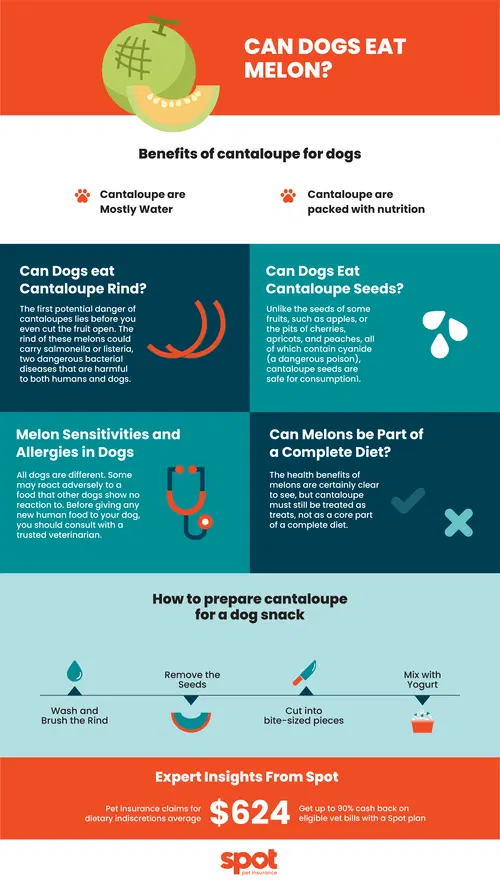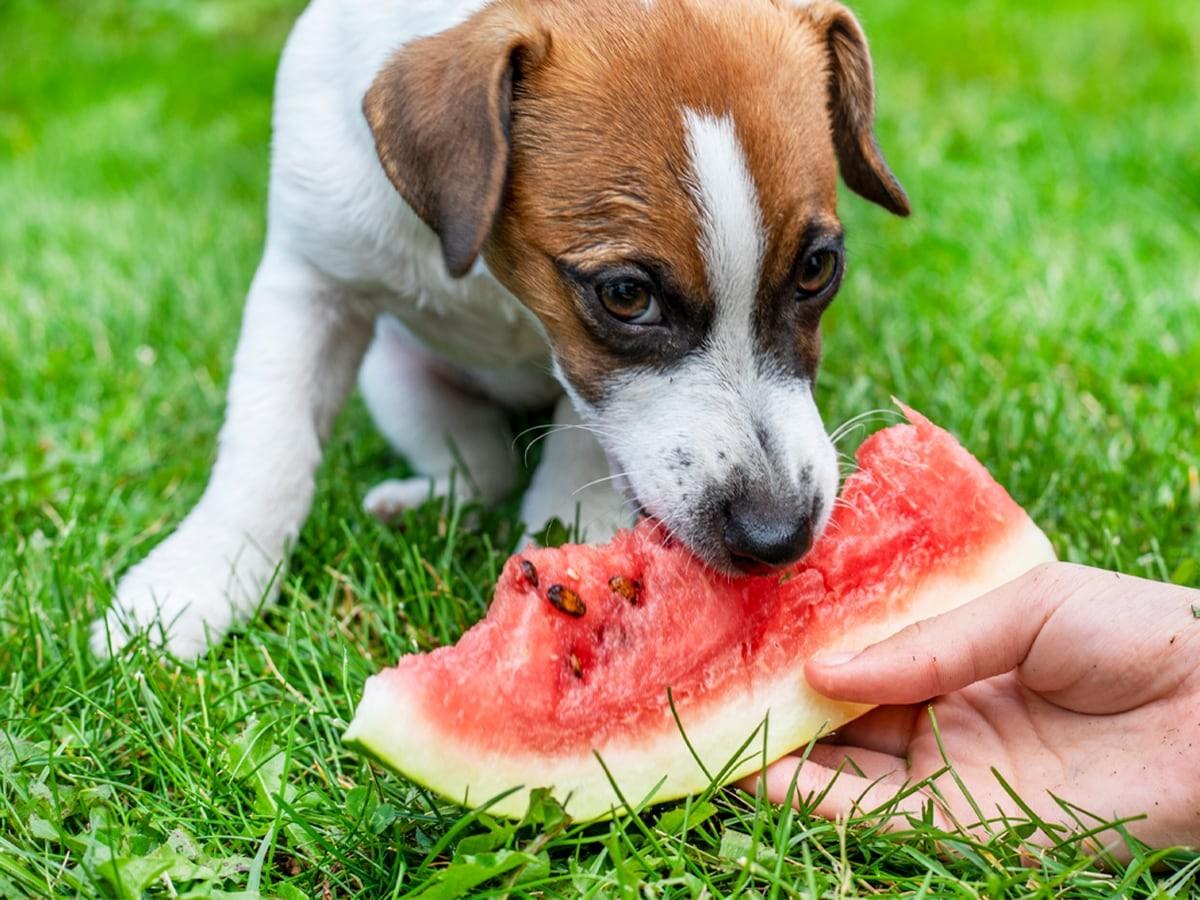Fruits are a favorite snack for many of us humans, especially as the warmer seasons roll in and more fruits are in season. It’s only natural that we may want to share our favorite snacks with the pets we love, especially when our dogs turn those big puppy eyes at us.
As pet parents, we want to keep our dogs happy, and turning them down from a bite of our food isn’t always easy. However, we are also responsible for our dogs’ health and well-being, so it is vital to be well-informed on what foods they can and can’t safely eat before giving them food of any kind.
Even fruits and veggies that are healthy for us aren’t always safe or healthy for our dogs, but in the case of today’s Spot Pet Insurance topic, melons, the stars align!
Read on to learn about the potential health benefits of melons, as well as precautions you should take and ideas for snack time!

Meet the Melon
The melon family includes watermelon, honey dew, cucumbers, and cantaloupe, among others. Today, we’re focusing on cantaloupe, also known simply as melon, rock melon, or musk melon.
For humans, cantaloupe is often considered a superfood, although this term is often used lightly. Without a doubt, cantaloupe, like many fruits, have outstanding nutritional benefits for us, although they must still be consumed in moderation as with anything.
Dogs are much more similar to humans than cats and can often derive similar results from fruits and veggies. In the case of cantaloupe, the flesh of the fruit is not considered toxic to dogs. Therefore, this fruit can overall be viewed as a safe snack!1
Let’s break down some of the pros and cons of cantaloupe for canines.
Benefits of Cantaloupe for Dogs
Cantaloupe is a fruit with many strong upsides and very few downsides, making it one of the best alternative treats for dogs. It’s a great hydrator with low calories and tons of vitamins, minerals, and nutrients that are vital to canine health.
Cantaloupe are mostly water
The first thing to know about these musky melons is that they are mostly water — 90%, in fact!2
This aspect of their composition has benefits in two main respects. The first is that cantaloupe can help keep your dog hydrated. Obviously, you shouldn’t be replacing water with cantaloupe, but this fruit can add extra water to your dog’s system, which can be especially vital on hot days.
The water content of cantaloupe also contributes to its low glycemic index, a measure of how a food affects blood sugar levels. Cantaloupe is a sweet fruit and does contain sugar, but the amount of sugar it contains per pound is relatively low compared to many other fruits, largely due to how much of the fruit is water.
Often these melons might even be recommended by a veterinarian for dogs with weight issues or diabetes mellitus, so you should consult your vet if you’re looking for appropriate treats for a dog in such a situation.
Cantaloupe are packed with nutrition
Cantaloupe is packed with all sorts of beneficial nutrients that humans and dogs can enjoy.2
Dietary fiber from this fruit can help with gut health, aiding your dog’s digestive system. These melons are also an excellent source of antioxidants, including vitamin A, vitamin C, beta carotene, selenium, lutein, choline, and zeaxanthin.
Antioxidants protect against oxidation, which is the deterioration of normal cells caused by free radicals. Oxidation is often associated with the effects of aging, so while cantaloupe won’t magically stop time, it can help your dog’s body feel a little younger as they age. Antioxidants are also anti-inflammatory and support your dog’s brain health, immune system, and cardiac health. They can also help prevent certain cancer risks.
Potassium, an electrolyte vital to canine health, is another big benefit packed into cantaloupes. Potassium aids heart health, contributes to a healthy nervous system, helps with muscle health, and aids overall growth. Without enough potassium, dangerous conditions such as hypokalemia could occur.
Other benefits include niacin, which turns sugar and fat into energy, magnesium, which helps break down protein and fatty acids, manganese, vitamin K, folate, and more.3
On top of all these dietary benefits, cantaloupe doesn’t contribute much to your dog’s caloric intake. These low-calorie, low-sugar, high-nutrient fruits are truly amazing, but you should be aware of some potential (and avoidable) downsides.
Potential Dangers and Downsides of Cantaloupe
Cantaloupe is typically a safe fruit overall, but only when properly prepared and portioned to be served to your dog. You shouldn’t just leave out slices of cantaloupe unattended, nor let your dog pick through your picnic basket at will.
Can dogs eat cantaloupe rind?
The first potential danger of cantaloupes lies before you even cut the fruit open. The rind of these melons could carry bacteria like salmonella or listeria,4 and could also pose a choking hazard.
While this may not be a common problem, you should still be careful of the risk of bacteria on your cantaloupe. We’ll talk more about how to safely prepare cantaloupe with these bacteria in mind a little later in this guide.
If your dog does contract salmonella or listeria due to eating a cantaloupe rind, the symptoms may vary. Some cases could be relatively minor or even asymptomatic, while others could be severe and even life-threatening.
Can dogs eat cantaloupe seeds?
Unlike the seeds of some fruits, such as apples, or the pits of cherries, apricots, and peaches, all of which contain cyanide (a dangerous poison), cantaloupe seeds are safe for consumption1.
However, that doesn’t mean you should let your dog eat them. The seeds are mostly indigestible and can cause stomach upset, so it’s best to remove the mushy flesh full of seeds from cantaloupe before giving the fruit to your dog.
Like seeds, the leaves and vines of cantaloupe are also indigestible. This part of the melon likely won’t seem appetizing to your dog anyway, but it’s the safest practice to keep it away from them as needed.
Melon sensitivities and allergies in dogs
All dogs are different. Some may react adversely to a food that other dogs show no reaction to. Before giving any new human food to your dog, you should consult with a trusted veterinarian. Additionally, there are certain signs you should look for after feeding a new food in case your dog does have or develop a food sensitivity.
These signs can often include vomiting, diarrhea, itchiness, poor skin, poor coat, chronic ear infections, foot infections, hives, facial swelling, and in the most severe cases, anaphylactic shock.
Expert Insights From Spot
Tempting as it may be to share our favorite foods with our pets, it's vital to recognize that not all human foods are safe for dogs. According to Spot's internal data, pet insurance claims for dietary indiscretions average $642*, emphasizing the importance of caution and thorough research before treating your pet to a snack.
Can Melons Be Part of a Complete Diet?
The potential health benefits of melons are certainly clear to see, but cantaloupe must still be treated as treats, not as a core part of a complete diet.
You should only give your dog cantaloupe only in moderation and only after consulting a trusted veterinarian who knows your dog.
Moderation can mean different amounts for different dogs. A general rule is that your dog should get at least 90% of their daily calories from balanced dog food and no more than 10% from treats.
How to Prepare Cantaloupe for a Dog
The most important first step is to wash and brush the rind since cantaloupe rind can trap bacteria. Cutting the rind, if it is unwashed, could contaminate your knife and, subsequently, the fruit flesh, so this step is essential.
Once you’ve washed and cut the fruit, you should also remove the seeds. You can simply cut out the entire mushy area of flesh around the seeds.
It’s best to cut down the remaining fruit flesh into bite-sized pieces. Small dogs are particularly prone to choking hazards, but large dogs can eat too quickly and choke as well, so help by serving proper portions.
If you’re looking to spice up snack time and add even more nutritional benefits, mix a few pieces of cantaloupe with a small serving of plain greek yogurt (ensuring it has no artificial ingredients) with other safe fruits such as strawberries, mango, and blueberries.
Other Fruits That Are Safe To Eat for Your Dog
If your dog tends to turn up its nose at a treat that’s been offered many times before, or if you simply want to add variety to their diet, you can try these fruits as well:
Remember that grapes and raisins are never fruits you should feed your dog. These have particular enzymes in them that are toxic to dogs—avoid grapes and raisins around your dog like you avoid chocolate! We have compiled a big list of all the fruits your dogs should eat here.
Final remarks
We’re committed to helping you through the pet parent journey every step of the way, from feeding your dog healthy snacks to understanding their illnesses and learning how to care for their coat.

As Spot’s resident cat enthusiast, I am dedicated to researching and sharing information that helps pet owners take the best care of their pets. Pet ownership comes with it’s share of challenges, but my goal is to help make this journey easier.
*Jan 2019 to Aug 2024 administrator claims data.
Burke, Anna. “Can Dogs Eat Cantaloupe? Is Cantaloupe Good for Dogs?” American Kennel Club, American Kennel Club, 9 July 2024, www.akc.org/content/health/articles/can-dogs-eat-cantaloupe/.
Bosco, Phoebe. “Can Dogs Eat Melon, Cantaloupe or Honeydew?” Bug Bakes, 8 Apr. 2022, bugbakes.co.uk/blogs/blog/can-dogs-eat-melon.
“Can Dogs Eat Cantaloupe?” PetMD, 30 Sept. 2022, www.petmd.com/dog/nutrition/can-dogs-eat-cantaloupe.
“Food Safety Tips for Melons,” Government of Canada, www.canada.ca/en/health-canada/services/food-safety-fruits-vegetables/melons.html.
The information presented in this article is for educational and informational purposes only and does not constitute or substitute for the advice of your veterinarian.












